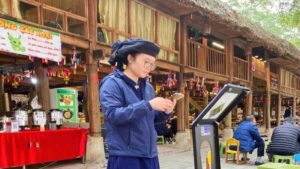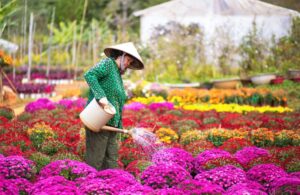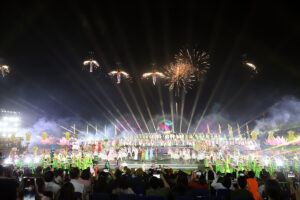In addition to enticing tourists from near and far, Ha Noi's cuisine has also won over world-renowned politicians and culinary experts, including former French President François Hollande, former U.S. President Barack Obama, South Korean President Yoon Suk-yeol, Dutch Prime Minister Mark Rutte, US Secretary of State Antony John Blinken, and the late celebrity chef Anthony Bourdain.

Australian Prime Minister Anthony Albanese drinks Ha Noi draft beer during his visit to Vietnam in June 2023. Photo: VNA
Many of Ha Noi's dishes have been honored by foreign travel websites and included in their guides. This gives the city a fresh impetus to promote its gastronomic culture and increase its competitiveness as a cultural product.
A major resource for the cultural sector
Ha Noi's food is seen as a cultural heritage with both material and spiritual components, including materials, recipes, flavors, scents and table manners. These features not only have socio-economic significance, but also demonstrate cultural richness, enhancing the city's reputation and attracting both domestic and foreign tourists to the capital.
These visitors usually crave local food, especially traditional dishes that are steeped in Vietnamese cultural identity, such as beef noodle soup, Ha Noi spring rolls, snail vermicelli soup, West Lake shrimp cakes, fish cakes, rice vermicelli with grilled pork and herbs, green rice flakes and egg coffee. If you go to the Old Quarter at night, you will see specialized culinary streets like Ta Hien, Ma May, Cau Go, Dong Xuan, Luong Ngoc Quyen, Tong Duy Tan, and Hang Cot, all packed with tourists. With the area’s popularity, the city has opened other food streets to boost tourism, including the Dao Ngoc - Ngu Xa nighttime culinary-pedestrian area, West Lake Temple food street, as well as traditional cuisine restaurants.
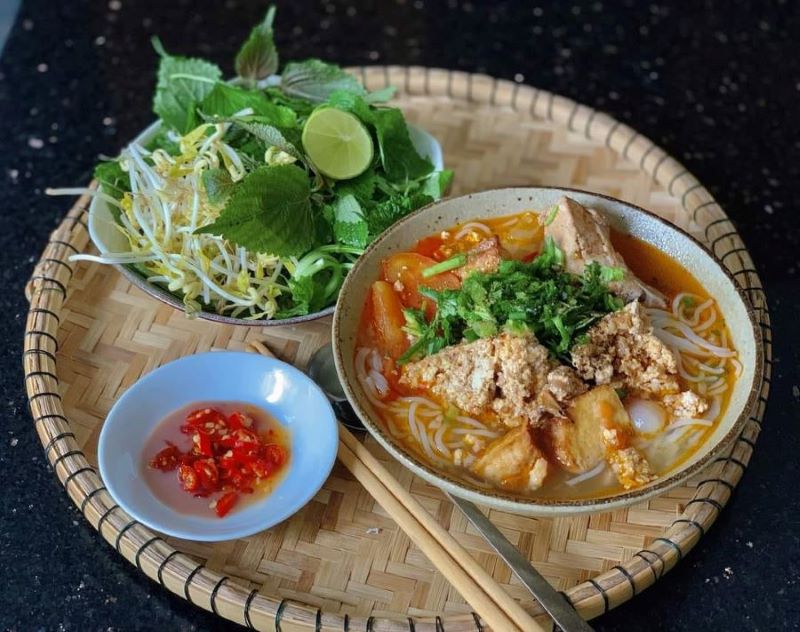
A Ha Noi speciality: Bun rieu or fresh noodle soup with rice field crab. Photo: Thanh Hang
In 2023, 48 restaurants in Ha Noi - along with 55 in Ho Chi Minh City - were recommended by the Michelin Guide (the world's most prestigious culinary guide), three of which were awarded one star. The city was also voted the world's best food destination in 2024 by readers of the leading travel site TripAdvisor after coming third in 2023.
According to Pham Quynh Phuong, Head of the Department of Cultural and Creative Industries, School of Interdisciplinary Studies, Vietnam National University, Ha Noi, cuisine is indispensable in the cultural industries ecosystem because it is an important cultural element - both material and spiritual - in the interaction between culture and the economy.
Many researchers also assert that cuisine is becoming a competitive advantage and a key factor in branding a country or tourist destination. Italy, for example, is known not only for its heritage of Renaissance art, but also as the birthplace of pizza. In the same way, France not only has a rich culture and history, but is also the cradle of classic cuisine with cheese-making techniques. Meanwhile, China has four major culinary schools: Guangdong, Shandong, Sichuan and Jiangsu.

Famous international Tiktokers try Pho cuon or rolled Pho with beef and fresh herbs at a restaurant in Ngu Xa Night Food Street. Photo: Pho cuon Chinh Thang
Ha Noi has enormous potential and advantages for turning its cuisine into a cultural product. However, the use of Ha Noi's cuisine for the development of the cultural industry is still at an early stage and lacks a specific, methodical plan. According to the resolution of the Ha Noi Party Committee on the development of cultural industries in the capital from 2021 to 2025, with a direction to 2030 and a vision to 2045, the cuisine is identified as one of the fields with great potential and advantage of the capital in the development of cultural industries.
Making cuisine a product of the cultural sector
"At present, there are a lot of culinary competitions, but they only end up in the form of game shows and haven't created great cultural values for development. It's important for Ha Noi to take advantage of the quintessential value of Ha Noi cuisine and develop it into a valuable cultural product," said Do Dinh Hong, director of Ha Noi's Department of Culture and Sports.
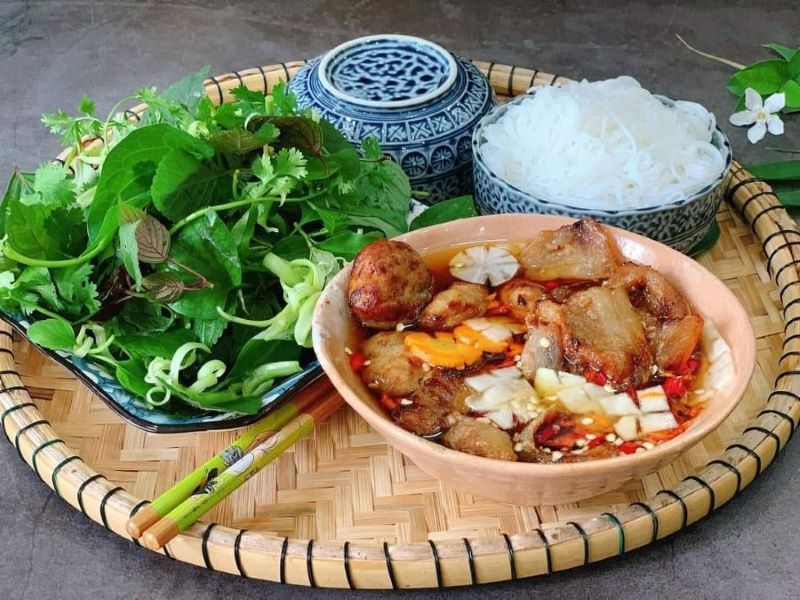
A serving of bun cha or grilled pork with noodles, another Ha Noi specialty. Photo: Thanh Hang
In order to find a suitable direction for the exploitation and development of gastronomic culture as a cultural product, it is necessary to have a serious commitment on the part of administrative bodies, local authorities, as well as organizations and individuals who maintain the culture.
In recent years, Ha Noi has organized various activities to promote the city's cuisine to both domestic and foreign tourists. These include the annual Quintessential Vietnamese Cuisine event, which brings together professional associations, artisans, businesses and restaurants to showcase the delicacies of Ha Noi and the country as a whole.
Ha Noi's traditional cultural and culinary values are also honoured, preserved and promoted through the annual Hanoi Culinary Culture Festival. But these activities do not seem to be enough to raise the standard of Ha Noi's gastronomy.
Culinary services and products will be diversified to meet the needs of citizens and tourists, focusing on unique types such as night food streets and culinary craft villages, in line with Ha Noi City's tourism development direction until 2030. The Ha Noi Department of Tourism will develop a map of food tours so that visitors can explore and experience the local cuisine on their own.

International visitors to Ngu Xa night food street. Photo: Duy Khanh
From an academic point of view, Ha Noi University of Culture advised that the city should develop strategies and plans for the promotion of food culture in the context of cultural industry development. On the one hand, the city should identify target markets to design appropriate and effective promotion programs and plan and invest in food tours and culinary products with a focus.
On the other hand, in order to turn cuisine into a lucrative product of the cultural sector, Hanoi needs to organize exchanges and cooperation activities at home and abroad on its culinary culture and have policies to support and develop the startup ecosystem, especially in the field of culinary culture.
Ha Noians have long been regarded as food connoisseurs and fashionistas, and Ha Noi's gastronomy is unique. Turning this resource into a valuable cultural product that benefits the capital requires proper evaluation, followed by methodical investment.
Jenna Duong




